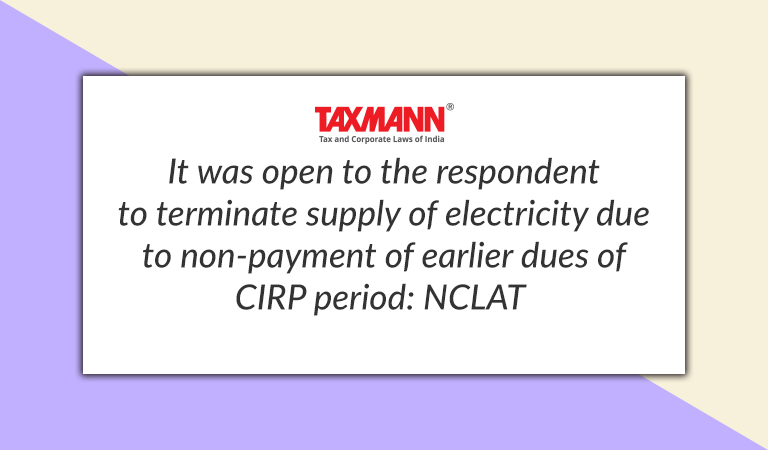It was open to the respondent to terminate supply of electricity due to non-payment of earlier dues of CIRP period: NCLAT
- News|Blog|Insolvency and Bankruptcy Code|
- 2 Min Read
- By Taxmann
- |
- Last Updated on 5 December, 2022

Case Details: Shailesh Verma, Resolution Professional of Lavasa Corporation Ltd. v. Maharashtra State Electricity Distribution Company Ltd. - [2022] 145 taxmann.com 148 (NCLAT- New Delhi)
Judiciary and Counsel Details
-
- Justice Ashok Bhushan, Chairperson, M. Satyanarayana Murthy, Judicial Member
& Barun Mitra, Technical Member - Sumesh Dhawan, Ms Kriti Kalyani & Ms Salonee Kulkarni, Advs. for the Appellant.
- Satvik Varma, Sr. Adv., Ms Drishti Harpalani, Aakash Kothari, Ms Ramni Taneja & Akshay Sapre, Advs. for the Respondent.
- Justice Ashok Bhushan, Chairperson, M. Satyanarayana Murthy, Judicial Member
Facts of the Case
In the instant case, the corporate debtor entered into a distribution franchisee agreement (DFA) with the respondent under which, the respondent was to supply electricity. DFA expired and the respondent informed the corporate debtor by letter about its intention not to renew the DFA.
Subsequently, the CIRP against the corporate debtor was commenced by an order of the Adjudicating Authority (NCLT) and the appellant was appointed as RP. Further, during the moratorium period, the respondent continued to supply electricity to the corporate debtor even though DFA came to an end.
Thereafter, the respondent issued notices declaring its intention to not renew the DFA of the corporate debtor. The appellant filed an application before the National Company Law Tribunal (NCLT) seeking direction from the respondent to continue the supply of electricity.
However, the respondent opposed the said application and stated that during the moratorium, electricity was supplied to the corporate debtor, however, the dues of the respondent during the CIRP period remained unpaid.
The NCLT by impugned order directed the respondent to continue to supply uninterrupted electricity to the corporate debtor and RP was further directed to pay outstanding dues for the CIRP period within 90 days. Thereafter, an appeal was made to the National Company Law Appellate Tribunal (NCLAT) against the order passed by the NCLT.
The appellant submitted that electricity dues during the CIRP period could only be paid as per the approved resolution plan and the Adjudicating Authority had no jurisdiction to direct for payment of electricity bills during the CIRP period and, therefore, the impugned order was unsustainable.
NCLAT Held
The NCLAT observed that the supply of essential goods or services to the corporate debtor would not be terminated or suspended during the moratorium period, however, on non-payment of dues as per section 14(2-A) of the IBC, it would always be open to the respondent to terminate the supply of same.
The NCLAT held that the corporate debtor was under an obligation to make payment of electricity dues of the CIRP period and directions issued by the Adjudicating Authority to make payment of outstanding dues couldn’t be faulted.
Accordingly, the appeal was to be dismissed.
List of Cases Reviewed
-
- Order of NCLT in I.A.1661/2021 in CP (IB) 1765/MB/C-II/2018) (para 14) affirmed.
Disclaimer: The content/information published on the website is only for general information of the user and shall not be construed as legal advice. While the Taxmann has exercised reasonable efforts to ensure the veracity of information/content published, Taxmann shall be under no liability in any manner whatsoever for incorrect information, if any.

Taxmann Publications has a dedicated in-house Research & Editorial Team. This team consists of a team of Chartered Accountants, Company Secretaries, and Lawyers. This team works under the guidance and supervision of editor-in-chief Mr Rakesh Bhargava.
The Research and Editorial Team is responsible for developing reliable and accurate content for the readers. The team follows the six-sigma approach to achieve the benchmark of zero error in its publications and research platforms. The team ensures that the following publication guidelines are thoroughly followed while developing the content:
- The statutory material is obtained only from the authorized and reliable sources
- All the latest developments in the judicial and legislative fields are covered
- Prepare the analytical write-ups on current, controversial, and important issues to help the readers to understand the concept and its implications
- Every content published by Taxmann is complete, accurate and lucid
- All evidence-based statements are supported with proper reference to Section, Circular No., Notification No. or citations
- The golden rules of grammar, style and consistency are thoroughly followed
- Font and size that’s easy to read and remain consistent across all imprint and digital publications are applied



 CA | CS | CMA
CA | CS | CMA
